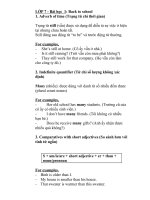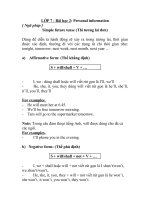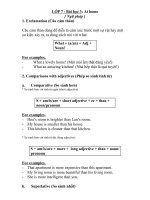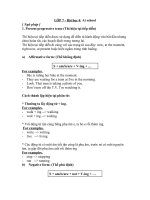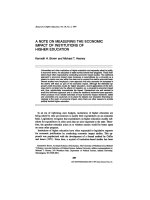supply credit note credit note credit note
Bạn đang xem bản rút gọn của tài liệu. Xem và tải ngay bản đầy đủ của tài liệu tại đây (1.57 MB, 67 trang )
1.
1
2
SUPPLY UNDER GST
LEARNING OUTCOMES
After studying this Chapter, you will be able to –
analyse the taxable event under GST – Supply – its meaning
and scope.
compare
and appreciate the differences between the
taxable events under earlier indirect taxes regime and the
GST regime.
identify the transactions that will amount to supply even
without any consideration
classify certain transactions/activities as supply of goods or
supply of services.
pinpoint the transactions which will be neither the supply of
goods nor the supply of services.
explain the composite and mixed supplies.
© The Institute of Chartered Accountants of India
2.2
1.
GOODS AND SERVICES TAX
INTRODUCTION
A taxable event is any transaction or occurrence
that results in a tax consequence. Before levying
any tax, taxable event needs to be ascertained. It
is the foundation stone of any taxation system; it
determines the point at which tax would be levied.
U nd e r t he e a r l i e r i n d i re ct t a x re g i m e , t he
framework of taxable event in various statutes was
prone to catena of interpretations resulting in
litigation since decades. The controversies largely related to issues like whether a
particular process amounted to manufacture or not, whether the sale was predetermined sale, whether a particular transaction was a sale of goods or
rendering of services etc.
T h e G S T l a w s re s o l v e t h e s e i s s u e s b y l a y i n g d o w n o n e
comprehensive taxable event i.e. “Supply” - Supply of goods or
services or both. Various taxable events namely manufacture,
sale, rendering of service, purchase, entry into a territory of State etc. have been
done away with in favour of just one event i.e. Supply.
GST Law, by levying tax on the ‘supply’ of goods and/or services, departs from the
historically understood concepts of ‘taxable event’ under the State VAT Laws,
Excise Laws and Service Tax Laws i.e. sale, manufacture and service respectively.
In the GST regime, the entire value of supply of goods and /or services is
taxed in an integrated manner, unlike the earlier indirect taxes, which were
charged independently either on the manufacture or sale of goods, or on the
provisions of services.
2.
RELEVANT DEFINITIONS
Goods: means every kind of movable property other than money and
securities but includes actionable claim, growing crops, grass and things
© The Institute of Chartered Accountants of India
SUPPLY UNDER GST
2.3
attached to or forming part of the land which are agreed to be severed
before supply or under a contract of supply. [Sec. 2(52) of CGST Act].
Principal: means a person on whose behalf an agent carries on the
business of supply or receipt of goods or services or both [Section 2(88)
of CGST Act].
Competent authority: means such authority as may be notified by the
Government [Section 2(29) of the CGST Act].
Family: means, —
(i)
the spouse and children of the person, and
(ii) the parents, grand-parents, brothers and sisters of the person if they
are wholly or mainly dependent on the said person [Section 2(49) of
the CGST Act].
Government: means the Central Government [Section 2(53) of the CGST Act].
Local authority: means —
(a)
a “Pa n c h a y a t ” a s d e fi n e d i n c l a u s e ( d ) o f a r t i c l e 2 4 3 o f t h e
Constitution.
(b)
a “Municipality” as defi ned in clause (e) of article 243P of the
Constitution.
(c)
a Municipal Committee, a Zilla Parishad, a District Board, and any
other authority legally entitled to, or entrusted by the Central
Governme nt or any State Governme nt with the control or
management of a municipal or local fund.
(d)
a Cantonment Board as defi ned in section 3 of the Cantonments
Act, 2006.
(e)
a Regional Council or a District Council constituted under the Sixth
Schedule to the Constitution.
(f)
a D e v e l o p m e n t B o a rd c o n s t i t u t e d u n d e r a r t i c l e 3 7 1 J o f t h e
Constitution.
(g)
a Re g i o n a l C o u n c i l c o n s t i t u t e d u n d e r a r t i c l e 3 7 1 A o f t h e
Constitution [Section 2(69) of the CGST Act].
© The Institute of Chartered Accountants of India
2.4
GOODS AND SERVICES TAX
Business: includes –
(a) any trade, commerce, manufacture, profession, vocation, adventure,
wager or any other similar activity, whether or not it is for a pecuniary
benefit;
(b) any activity or transaction in connection with or incidental or ancillary
to (a) above;
(c) any activity or transaction in the nature of (a) above, whether or not
there is volume, frequency, continuity or regularity of such transaction;
(d) supply or acquisition of goods including capital assets and services in
connection with commencement or closure of business;
(e) provision by a club, association, society, or any such body (for a
subscription or any other consideration) of the facilities or benefits to its
members, as the case may be;
(f) admission, for a consideration, of persons to any premises; and
(g) services supplied by a person as the holder of an office which has
been accepted by him in the course or furtherance of his trade, profession
or vocation;
(h) services provided by a race club by way of totalisator or a licence to
book maker in such club
(i) any activity or transaction undertaken by the Central Government, a
State Government or any local authority in which they are engaged as
public authorities
[Section 2(17) of CGST Act].
Consideration: in relation to the supply of goods or services or both
includes:
any payment made or to be made, whether in money or otherwise,
in respect of, in response to, or for the inducement of, the supply
of goods or services or both, whether by the recipient or by any
other person but shall not include any subsidy given by the Central
Government or a State Government,
the monetary value of any act or forbearance, in respect of, in
response to, or for the inducement of, the supply of goods or
© The Institute of Chartered Accountants of India
SUPPLY UNDER GST
2.5
services or both, whether by the recipient or by any other person
but shall not include any subsidy given by the Central Government
or a State Government.
However, a deposit given in respect of the supply of goods or services or
both shall not be considered as payment made for such supply unless
the supplier applies such deposit as consideration for the said supply.
[Section 2(31) of CGST Act].
Actionable claim: means a claim to any debt, other than a debt secured
by mortgage of immovable property or by hypothecation or pledge of
movable property, or to any beneficial interest in movable property not in
the possession, either actual or constructive, of the claimant, which the civil
courts recognise as aff ording grounds for relief, whether such debt or
beneficial interest be existent, accruing, conditional or contingent [Section
2(1) of CGST Act read with section 3 of the Transfer of Property Act, 1882].
Manufacture:
that results in
and use and
[Section 2(72)
Money: means the Indian legal tender or any foreign currency, cheque,
promissory note, bill of exchange, letter of credit, draft, pay order, traveller
cheque, money order, postal or electronic remittance or any other instrument
recognised by the Reserve Bank of India when used as a consideration to settle
an obligation or exchange with Indian legal tender of another denomination
but shall not include any currency that is held for its numismatic value
[Section 2(75) of CGST Act].
Taxable supply: means a supply of goods or services or both which is
leviable to tax under this Act [Section 2(108) of CGST Act].
Taxable territory: means the territory to which the provisions of this
Act apply [Section 2(109) of CGST Act].
Services: means anything other than goods, money and securities but
includes activities relating to the use of money or its conversion by cash
or by any other mode, from one form, currency or denomination, to
a not her f orm, curre ncy or de nomi nation f or whi ch a separate
consideration is charged [Section 2(102) of CGST Act].
means processing of raw material or inputs in any manner
emergence of a new product having a distinct name, character
the term “manufacturer ” shall be construed accordingly
of CGST Act].
© The Institute of Chartered Accountants of India
2.6
GOODS AND SERVICES TAX
Supplier: in relation to any goods or services or both, shall mean the
person supplying the said goods or services or both and shall include an
agent acting as such on behalf of such supplier in relation to the goods
or services or both supplied [Section 2(105) of CGST Act].
Person: includes [Section 2(84) of CGST Act]-
An individual
A firm
A HUF
A Limited Liability
Partnership
A company
An association of persons
or a body of individuals,
whether incorporated or
not, in India or outside
India
Any corporation established
Any body corporate
A co-operative society
by/under any Central, State or
incorporated by or
registered under any
Provincial Act or Government
under
the
laws
of
a
law
relating
to
company as defined in section
2(45) of Companies Act, 2013
country outside India
cooperative societies
A local authority
Central
Government/State
Government
Trust
Society as defined
under the Societies
Registration Act,
1860
Every artificial juridical
person, not falling
above
Recipient: of supply of goods and/or services means(a)
w he re a con si d er ati o n i s p aya bl e f or t he sup p l y of g ood s or
services or both, the person who is liable to pay that consideration,
(b)
where no consideration is payable for the supply of goods, the
person to whom the goods are delivered or made available, or to
whom possession or use of the goods is given or made available,
and
© The Institute of Chartered Accountants of India
SUPPLY UNDER GST
(c)
2.7
where no consideration is payable for the supply of a service, the
person to whom the service is rendered,
a nd a ny ref ere nce to a per son to w hom a suppl y is ma de sha ll be
construed as a reference to the recipient of the supply
and shall include an agent acting as such on behalf of the recipient in
relation to the goods or services or both supplied. [Section 2(93) of
CGST Act]
Our discussion in this Study Material will principally be confined to the provisions of
CGST and IGST laws as the specific State GST laws are outside the scope of syllabus.
3.
CONCEPT OF SUPPLY [SECTION 7 OF CGST ACT]
The concept of ‘supply’ is the key stone of the GST architecture. The provisions
relating to meaning and scope of supply are contained in Chapter III of the CGST
Act read with various Schedules given under the said Act. Following sections and
schedules shall be discussed in this chapter to understand the concept of supply:
Section 7
Meaning and scope of supply
Section 8
Taxability of composite and mixed supplies
Schedule I
Matters to be treated as supp ly even if made wit hout
consideration
Schedule II
Matters to be treated as supply of goods or as supply of
services
Schedule III
Matters or transactions which shall be treated neither as
supply of goods nor as supply of services.
STATUTORY PROVISIONS
Section 7
Sub Section
(1)
Meaning and Scope of Supply
Clause
Particulars
Supply includes (a)
all forms of supply of goods or services or both such as
© The Institute of Chartered Accountants of India
2.8
GOODS AND SERVICES TAX
sale, transfer, barter, exchange, licence, rental, lease or
disposal made or agreed to be made for a
consideration by a person i n t he course or
furtherance of business
(1A)
(2)
(b)
importation of services, for a consideration whether
or not in the course or furtherance of business, and
(c)
the activities specified in Schedule I, made or agreed
to be made without a consideration.
where certain activities or transactions, constitute a supply
in accordance with the provisions of sub-section (1), they
shall be treated either as supply of goods or supply of
services as referred to in Schedule II.
Notwithstanding anything contained in sub-section (1),
(a)
activities or transactions specified in Schedule III; or
(b)
such activities or transactions undertaken by the Central
Government, a State Government or any local authority
in which they are engaged as public authorities, as may
be notified by the Government on the recommendations
of the Council
shall be treated neither as a supply of goods nor a supply of
services.
(3)
Schedule-I
Subject to sub-sections (1), (1A) & (2), the Government may, on
the recommendations of the Council, specify, by notification, the
transactions that are to be treated as —
(a)
a supply of goods and not as a supply of services; or
(b)
a supply of services and not as a supply of goods.
Activities to be treated as supply even if made without
consideration
S. No.
Particulars
1.
Permanent transfer or disposal of business assets where input tax
credit has been availed on such assets.
2.
Supply of goods or services or both between related persons or
© The Institute of Chartered Accountants of India
SUPPLY UNDER GST
2.9
between distinct persons as specified in section 25, when made in
the course or furtherance of business.
Provided that gifts not exceeding fifty thousand rupees in value in
a financial year by an employer to an employee shall not be
treated as supply of goods or services or both.
3.
Supply of goods —
(a) by a principal to his agent where the agent undertakes to
supply such goods on behalf of the principal; or
(b) by an agent to his principal where the agent undertakes to
receive such goods on behalf of the principal.
4.
Import of services by a taxable person from a related person or
from any of his other establishments outside India, in the course
or furtherance of business.
ANALYSIS
The definition of ‘supply’ as contained in section 7 of the CGST Act is an
inclusive definition and does not define the term exhaustively. It defines the
scope of supply in an inclusive manner. Clause (a) of sub-section (1)
illustrates the modes of supply, but the list is not exhaustive. This is
substantiated by the use of words ‘such as’ in the definition.
Provisions of scope of supply under CGST Act have also been made
applicable to IGST Act vide section 20 of the IGST Act.
The meaning and scope of supply taxable under GST can be understood in
terms of following parameters:
1.
Supply should be of goods or services. Supply of anything other than
goods or services like money, securities etc. does not attract GST.
© The Institute of Chartered Accountants of India
2.10
GOODS AND SERVICES TAX
Money
Anything
which is
neither
goods nor
services
Goods
Securities
Services
2.
Supply should be made for a consideration.
3.
Supply should be made in the course or furtherance of business.
4.
Supply should be made by a taxable person.
5.
Supply should be a taxable supply.
Parameters
of taxable
supply
of goods
and services
in the
course or
for
furtherance
consideration
of business
Supply
should be
by a taxable
person
a taxable
supply
Aforesaid parameters describe the concept of taxable supply. However, there
nd
rd
are a few exceptions to 2 and 3 parameters [the requirement of supply
being made for a consideration and in the course or furtherance of business] in
the GST law. Some exceptions have been carved out where a transaction is
deemed to be a supply even without consideration. Similarly, the condition
of supply to be made in the course or furtherance of business has been
relaxed in case of import of services [Import of services for a consideration,
whether or not in the course or furtherance of business, is treated as supply].
© The Institute of Chartered Accountants of India
SUPPLY UNDER GST
2.11
Further, there are also cases where a transaction is kept out of scope of
supply despite the existence of the above parameters, i.e. there is a list of
activities which are treated neither as supply of goods nor as supply of services.
In other words, they are outside the scope of GST.
GST law has classified certain activities/transactions either as supply of goods
or as supply of services.
Government is also empowered to notify
transactions that are to be treated as a supply of goods and not as a supply
of services, or as a supply of services and not as a supply of goods.
In the subsequent paras, the above aspects of supply have been extensively
discussed. The discussion has been broadly categorised into following:
Supply for consideration in course or furtherance of
business [Section 7(1)(a)]
includes
Importation of services for consideration whether or not in
course or furtherance of business [Section 7(1)(b)]
Supply without consideration [Section 7(1)(c)
+ Schedule I]
Activities to be treated as supply of goods or supply of
services [Section 7(1A) + Schedule II]
excludes
Negative list [Section 7(2) + Schedule III]
T he de fi nit i on of sup p l y b e gi n s w it h t he t erm ‘Supply
includes’, thus making it clear that CGST Act intends to give an
Section
extensive meaning to the term ‘supply’. Supply includes all
7(1)(a)
forms of supply of goods or services or both. Supply of
anything other than goods or services does not attract GST.
The terms goods and services as defined under the Act have been analysed by
way of a diagram on next page. Anything supplied other than goods and
services is outside the scope of supply.
The first part of section 7 [Clause (a) of sub-section (1)] includes all forms of
supply of goods or services or both such as sale, transfer, barter, exchange,
license, rental, lease or disposal made or agreed to be made for consideration in
the course or furtherance of business.
© The Institute of Chartered Accountants of India
2.12
GOODS AND SERVICES TAX
Supply includes
sale, transfer, barter,
exchange, licence,
rental, lease,
disposal
in the course or
furtherance of
business
for consideration
Thus, the forms of supply as contemplated in this first part have two pre-requisites:
the supply should be for a consideration; and
the supply should be in the course or furtherance of business.
Goods
Service
means
means
Every kind of movable property
Anything other than goods
excludes
Money and securities
includes
(i)
includes
actionable claim**
Activities relating to:
(i) Use of money** or
(ii) growing crops, grass and things
attached to/forming part of the
(ii) Conversion of money by cash/by any
la nd w hic h are ag re ed to be
other
mode,
from
one
form/
severed before supply or under
currency/denomination, to another, for
a contract of supply.
which a separate consideration is
charged.
**Please refer the definitions of ‘actionable claims’ and ‘money’ as provided in
heading 2. – Relevant Definitions.
© The Institute of Chartered Accountants of India
SUPPLY UNDER GST
2.13
We shall now discuss the various modes of supply as enumerated in section
7(1)(a) in detail:
A. MODES OF SUPPLY
I.
Sale and Transfer: Earlier, VAT was levied by the State on the sale of goods
which was defined under most State VAT laws as transfer of property in
goods for consideration. Under the CGST Act, although sale has been
treated as a form of supply leviable to GST, the definition of ‘sale’ has not
been provided.
Further, the term ‘transfer’ which has also been included as a form of supply
is also not defined.
II.
Barter and Exchange: While barter may deal with a transaction which only
includes an exchange of goods/services, exchange may cover a situation
where the goods are partly paid for in goods and partly in money. When
there is a barter of goods or services, same activity constitutes supply as
well as consideration.
By making a specifi c inclusion in the defi nition of supply, all barters and
exchanges would be leviable to GST.
Example of exchange
When a new car worth ` 5,00,000 is purchased in exchange of an
old car alongwith the monetary consideration of ` 4,00,000 paid
for the said purchase.
Example of barter is as follows:
Doctor provides medical consultancy
Barber cuts doctor’s hair
Doctor
Barber
Medical consultancy is a SUPPLY of services by doctor. It is a
consideration for the hair cut by the barber.
III.
Licence, Lease, Rental etc.: Licenses, leases and rentals of goods were
earlier treated as services where the goods were transferred without
© The Institute of Chartered Accountants of India
2.14
GOODS AND SERVICES TAX
transfer of right to use (effective possession and control over the goods)
and were treated as sales where the goods were transferred with transfer of
right to use. Under the GST regime, such licenses, leases and rentals of
goods with or without transfer of right to use are covered under the supply
of service because there is no transfer of title in such supplies. Such
transactions are specifically treated as supply of service in Schedule-II of
CGST Act [Schedule-II has been discussed in detail in the subsequent paras].
As discussed earlier, one of the parameters for the supply of goods and/or
s e r v i c e s t o f a l l w i t h i n t he a m b i t of G S T i s t ha t a s u p p l y i s ma d e f o r a
consideration. This parameter has been explicated in the following paras:
B. CONSIDERATION
Consideration does not always mean money. It can be in money or kind. It
covers anything which might be possibly done, given or made in exchange for
something else. Further, a consideration need not always flow from the recipient
of the supply. It can also be made by a third person. The term consideration is
defined under section 2(31) of the CGST Act [Refer heading ‘Relevant Definitions].
The said definition has been depicted in the form of a diagram as follows:
CONSIDERATION
Payment in money
Monetary value of any
or otherwise for
act or forbearance for
the supply
Deposit to be considered
the supply
By recipient or any
other person
as payment
ONLY
when the supplier applies
such deposit as consideration
for the said supply
Excluding subsidy given
by
Central/
Governments
© The Institute of Chartered Accountants of India
State
SUPPLY UNDER GST
2.15
Thus, any subsidy given by the Central Government or a State Government is not
considered as consideration. A deposit given in respect of the supply of goods or
services or both shall not be considered as payment made for such supply unless
the supplier applies such deposit as consideration for the said supply.
Art works sent by artists to galleries for exhibition is not a supply
Artists give their work of art to galleries where it is exhibited
for supply. However, no consideration flows from the gallery
to the artist when the art works are sent to the gallery for
exhibition and therefore, the same is not a supply.
It is only when a buyer selects a particular art work displayed at the
gallery,
that the actual supply takes place and applicable GST would be payable
at
the time of such supply [Circular No. 22/22/2017 GST dated 21.12.2017].
Any transaction involving supply of
goods
and/or
services
without
consideration is not a supply unless it is
d ee med t o b e a su p p l y u n d er l a w [ a s
deemed in Schedule I of the CGST Act**].
**Provisions of Schedule I of the CGST Act have been discussed in detail later in this
chapter.
Another parameter for the supply of goods and/or services to fall within the
ambit of GST is that a supply is made in course or furtherance of business. This
parameter has been expounded in the following paras:
C.
IN COURSE OR FURTHERANCE OF BUSINESS
GST is essentially a tax only on commercial transactions. Hence, only those supplies
that are in the course or furtherance of business qualify as supply under GST.
Resultantly, any supplies made by an individual in his personal capacity do not come
under the ambit of GST unless they fall within the definition of ‘business’.
Rishabh buys a car for his personal use and after a year sells it to a car
dealer. Sale of car by Rishabh to car dealer is not a supply under CGST
Act because supply is not made by Rishabh in the course or furtherance
of business.
© The Institute of Chartered Accountants of India
2.16
GOODS AND SERVICES TAX
Radhika sold her old gold bangles and earrings to ‘Bhola Jewellers’. Sale
of old gold jewellery by an individual to a jeweller will not constitute
supply as the same cannot be said to be in the course or furtherance of
1
business of the individual .
Meaning of supply made in the course or furtherance of business: In order
to
understand the term ‘in the course or furtherance
of business’, we need to understand the term
‘business’. Business as defi ned under section
2(17) of the CGST Act, inter alia, includes any
trade, commerce, manufacture, profession, vocation etc.
whether or not undertaken for a monetary benefit.
It also includes any activity or transaction which is incidental or ancillary to the
aforementioned listed activities. In addition, any activity undertaken by the
Central Govt. or a State Govt. or any local authority in which they are engaged as
public authority shall also be construed as business. The definition of business has
been summarised in the diagram below:
Any trade/commerce, manufacture,
profession etc. even if there is no
monetary benefit
Any activity incidental/ ancillary to it
Any activity of same nature even if no
volume/continuity
Supply/acquisition of goods
in connection with commencement /
including capital goods &
closure of business
services
Provision of facilities by
to its members for consideration
club/association etc.
Admission for consideration
Services as holder of office
to any premises
accepted in course/ furtherance of trade, profession
Services by race club by way of
totalisator or a licence to book maker in such club
Any activity by Government /local authority as
public authorities
Any activity undertaken in course/ for furtherance of business would constitute a
supply. Since ‘business’ includes vocation, therefore sale of goods or service as a
vocation is also a supply under GST.
1
Clarified by CBIC vide press release dated 13.07.2017
© The Institute of Chartered Accountants of India
SUPPLY UNDER GST
2.17
Sundaram Acharya, a famous actor, paints some paintings and sells
them. The consideration from such sale is to be donated to a Charitable
Trust – ‘Kind Human’. The sale of paintings by the actor qualifies as
supply even though it is a one-time occurrence.
Services provided by the club/association to its members for consideration is a supply.
A Resident Welfare Association provides the service of depositing the
electricity bills of the residents in lieu of some nominal charges.
Provision of service by a club or association or society to its members is
treated as supply as this is included in the definition of ‘business’.
There is one exception to this
‘course or furtherance of
business’ rule i.e., import of
services for a consideration.
D. SUPPLY BY A TAXABLE PERSON
A supply to attract GST should be made by a taxable person. Hence, a supply
between two non-taxable persons does not constitute taxable supply under GST.
It is important to note that
supply can be made to a
non-taxable person also.
The restriction of being a taxable person is only on the supplier whereas the
recipient can be either taxable or non-taxable. Further, there is no condition that
supply needs to be made to another person, i.e. supplies made to self are also
taxable.
Meaning of taxable person: A “taxable person” is a person who is registered or
liable to be registered under section 22 or section 24 [The said sections and the
concept of taxable person thereto have been discussed in detail in Chapter 9 –
Registration].
© The Institute of Chartered Accountants of India
2.18
GOODS AND SERVICES TAX
Hence, even an unregistered person who is liable to be registered is a taxable
person. Similarly, a person not liable to be registered, but has taken voluntary
registration and got himself registered is also a taxable person.
E.
TAXABLE SUPPLY
For a supply to attract GST, the supply must be taxable. Taxable supply has been
broadly defi ned and means any supply of goods or services or both which, is
leviable to tax under the GST Law [Refer Chapter-3: Charge of GST for detailed
discussion on leviability of GST]. Exemptions may be provided to the specified
goods or services or to a specified category of persons/ entities making supply
[Refer Chapter-4: Exemptions from GST for detailed discussion].
CBIC has clarified the taxability of Cost Petroleum as follows:
As per the Production Sharing Contract (PSC) between the
Government and the oil exploration & production contractors,
in case of a commercial discovery of petroleum, the contractors
are entitled to recover from the sale proceeds all expenses
incurred in exploration, development, production and payment
of royalty. Portion of the value of petroleum which the contractor is entitled
to
take in a year for recovery of these contract costs is called “Cost Petroleum”.
The relationship of the oil exploration and production contractors with
the
Go ve rnm e nt i s not that of p art ne rs b ut t ha t of l ice nso r/ le sso r a nd
licensee/lessee in terms of the Petroleum and Natural Gas Rules, 1959.
Having
acquired the right to explore, exploit and sell petroleum in lieu of royalty and
a
share in profit petroleum, contractors carry out the exploration and
production
of petroleum for themselves and not as a service to the Government. Para
8.1 of
the Model Production Sharing Contract (MPSC) states that subject to
the
provisions of the PSC, the Contractor shall have exclusive right to carry
out
Petroleum Operations to recover costs and expenses as provided in
this
Contract. The oil exploration and production contractors conduct all
petroleum
operations at their sole risk, cost and expense. Hence, cost petroleum is
not a
consideration for service to GOI and thus not taxable per se.
However, cost petroleum may be an indication of the value of mining or
exploration services provided by operating member to the joint venture, in
a
situation where the operating member is found to be supplying service to the
oil
exploration and production joint venture.
[Circular No. 32/06/2018 GST dated 12.02.2018]
© The Institute of Chartered Accountants of India
SUPPLY UNDER GST
2.19
The connotation of ‘supply’ gets expanded signifi cantly
through the second part of section 7 i.e. 7(1)(b) which
brings within the ambit of ‘supply’, the importation of
Section
services for a consideration whether or not in the course
7(1)(b)
or furtherance of business. This is the only exception to
the condition of supply being in course or furtherance of
business.
Ramaiyaa, a proprietor, has received the architect services for his house
from an architect located in New York at an agreed consideration of
$ 5,000. The import of services by Ramaiyaa is supply under section
7(1)(b) though it is not in course or furtherance of business.
This includes all supplies made, even if the same is without
consideration. These are specifically mentioned in Schedule I
Section 7(1)(c)
appended to the CGST Act. The same has been discussedread
in with
the subsequent paras:
Schedule I
In the past regime, in every tax statute, “consideration” played
the most important role for levying taxes. For instance, if any service was provided
for free to a person, such service was not subject to service tax. However, under
GST, the importance of consideration has been diluted in certain cases – this is an
important departure from the earlier indirect tax regime.
As p e r S c he d ul e I, i n t he f ol l ow i ng f our c a s e s , s up p l i e s ma d e w i t ho u t
consideration will be treated as supply under section 7 of the CGST Act:
I.
Permanent Transfer/Disposal of Business Assets [ Pa r a 1 . o f
Schedule I]: Any kind of disposal or transfer of business assets made by an
entity on permanent basis even though without consideration qualifies as
supply. This clause is wide enough to cover transfer of business assets from
holding to subsidiary company for nil consideration.
However, it is important to note that this provision would apply only if input
tax credit has been availed on such assets.
© The Institute of Chartered Accountants of India
2.20
GOODS AND SERVICES TAX
XYZ & Co. donates old laptops to Charitable Schools when new
laptops are purchased by business will qualify as supply provided
input tax credit has been availed by XYZ & Co. on such laptops.
A cloth retailer gives clothes from his business stock to his friend
free of cost. In this case, transfer of business stock would amount
to ‘supply’ if he had claimed input tax credit on his purchase of
the business asset.
A de al er of ai r- co nd it i one r s pe rma ne nt l y tra n sf er s a n a ir
conditioner from his stock in trade, for personal use at his
residence. The transaction will constitute a supply as it is a
permanent transfer/ disposal of business assets. The only condition is that
input tax credit should have been availed on such assets.
II.
Supply between related person or distinct persons [Para 2. of
Schedule I]: Supply of goods or services or both between ‘related persons’
or between ‘distinct persons’ as specified in section 25, will qualify as supply
provided it is made in the course or furtherance of business.
Let us understand the terms ‘related persons’ and ‘distinct persons’.
Related persons: A person who is
under influence of another person is
called a related person like members
of the same family [See definition of
family under ‘Relevant Definitions’] or
subsidiaries of a group company etc.
Under GST law various categories of
related persons have been specified.
The term ‘related person’ has been
defined in explanation to section
15. The said definition has been depicted by way of a diagram as follows:
© The Institute of Chartered Accountants of India
SUPPLY UNDER GST
Persons
DEEMED AS
2.21
RELATED
PERSONS
include
IF
Such persons are
offi cers/directors of one
another’s business
Such persons are legally
recognised partners
Legal Persons
Such persons are employer
& employee
A third person controls/ own/
holds (directly/ indirectly) ≥
25% voting stock/shares of
both of them
One
of
them
controls
(directly/indirectly) the other
A
third
person
controls
(directly/indirectly) both of them
Such persons together
control (directly/indirectly) a
third person
Such persons are members
of the same family
One of them is the sole
agent/sole distributor/sole
concessionaire of the other
(i) Ms. Priya holds 30% shares of ABC Ltd. and 35% shares of
XYZ Ltd. ABC Ltd. and XYZ Ltd. are related.
(ii) Q Ltd. has a deciding role in corporate policy, operations
management and quality control of R Ltd. It can be said that Q Ltd. controls
R Ltd. Thus, Q Ltd. and R Ltd. are related.
Distinct Persons specified under section 25*: Sub-sections (4) and (5) of
section 25 contain the provisions relating to ‘distinct persons’.
© The Institute of Chartered Accountants of India
2.22
GOODS AND SERVICES TAX
A p e r s o n w h o h a s o b t a i n e d / i s re q u i re d t o o b t a i n m o re t h a n o n e
registration, whether in one State/Union territory or more than one
State/Union territory shall, in respect of each such registration, be treated as
distinct persons [Section 25(4) of the CGST Act].
Mohan, a Chartered Accountant, has a registered head offi ce in
Delhi. He has also obtained registration in the State of West
Bengal in respect of his newly opened branch office. Mohan shall
be treated as distinct persons in respect of registrations in West Bengal and
Delhi. Supply between Delhi offi ce and West Bengal offi ce, in course or
furtherance of business even without consideration will qualify as supply.
Further, where a person who has obtained or is required to obtain
registration in a State or Union territory in respect of an establishment, has
a n e s t a b l i s h m e n t i n a n o t h e r S t a t e o r U n i o n t e rr i t o r y , t h e n s u c h
establishments shall be treated as establishments of distinct persons
[Section 25(5) of the CGST Act].
Rishabh Enterprises, a regi stere d sup plier, ow ns a n a i rconditioned restaurant in Virar, Maharashtra. It has opened a
liquor shop in Raipur, Uttarakhand for trading of alcoholic liquor
for human consumption. Since supply of alcoholic liquor for human
consumption in Uttarakhand is a non-taxable supply, Rishabh Enterprises is
not required to obtain registration with respect to the same in Uttarakhand.
In this case, air-conditioned restaurant in Maharashtra and liquor shop in
Raipur [though unregistered] shall be treated as establishments of distinct
persons. Supply by Maharashtra office to Uttarakhand office, in course or
furtherance of business even without consideration will qualify as supply.
*Provisions of section 25 stipulate procedure for registration. They have been
discussed in Chapter – 9: Registration.
Stock transfers or branch transfers qualify as supply: In view of the
aforesaid discussion, transactions between different locations (with separate
GST registrations) of same legal entity (eg., stock transfers or branch
transfers) will qualify as ‘supply’ under GST which is in contrast to the earlier
regime.
Raghubir Fabrics transfers 1000 shirts from his factory located in
Lucknow to his retail showroom in Delhi so that the same can be
sold from there. The factory and retail showroom of Raghubir
Fabrics are registered in the States where they are located. Although no
© The Institute of Chartered Accountants of India
SUPPLY UNDER GST
2.23
consideration is charged, supply of goods from factory to retail showroom
constitutes supply.
Mo u ld s a nd die s ow ne d by O ri gi na l E quip m e nt
Manufacturers (OEM) that are sent free of cost (FOC)
to a component manufacturer (the two not being
re la te d p e rso ns o r d ist in ct pe rso n s) does not
constitute a supply as there is no consideration
involved [Circular No. 47/21/2018 GST dated 08.06.2018].
Supply of goods or services or both between an employer and
employee: By virtue of the defi nition of related person given above,
employer and employee are related persons. However, services provided by
an employee to the employer in the course of or in relation to his
employment are not treated as supply of services [Schedule III of CGST Act
(discussed in subsequent paras)].
Gifts by employer to employee
Further, Proviso to Para 2. of Schedule I provides that gifts not exceeding
` 50,000 in value in a financial year by an employer to an employee shall not
be treated as supply of goods or services or both. However, gifts of value
more than ` 50,000 made without consideration are subject to GST, when
made in the course or furtherance of business.
What
constitutes
a ‘gift’?
The term ‘gift’ has not been defined in the GST law. In
common parlance, gift is made without consideration,
is voluntary in nature and is made occasionally. It cannot be demanded as a
matter of right by the employee and the employee cannot move a court of
law for obtaining a gift.
As already mentioned that the services by an employee to the employer in
the course of or in relation to his employment is outside the scope of GST
(neither supply of goods or supply of services).
© The Institute of Chartered Accountants of India

